Linn Counselor Shannon Wolfe and Central Missouri Community Action (CMCA) Community Organizer Jenn Millard are pleased with the way students reacted to Thursday’s Reality Enrichment and Life …
This item is available in full to subscribers.
We have recently launched a new and improved website. To continue reading, you will need to either log into your subscriber account, or purchase a new subscription.
If you are a current print subscriber, you can set up a free website account by clicking here.
Otherwise, click here to view your options for subscribing.
Please log in to continue |
|
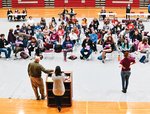
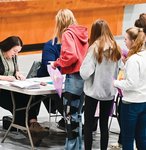
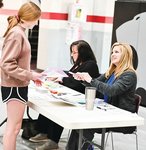
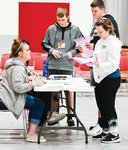
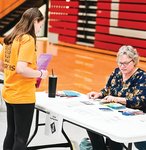


Linn Counselor Shannon Wolfe and Central Missouri Community Action (CMCA) Community Organizer Jenn Millard are pleased with the way students reacted to Thursday’s Reality Enrichment and Life Lessons Simulation (REALL) simulation.
“I felt the students grasped the concept of the simulation rather quickly during the beginning, especially with the reminders that were given out,” said Millard, noting she liked holding the proactive session first so students get the hang of the simulation before it gets too difficult.
Wolfe agreed. “The good and bad scenarios gave students an idea of how different their lives could be depending on the choices that they make,” she said, noting that during the proactive phase, students found time management to be the most challenging.
REALL is a simulation designed to challenge youth to think critically about how choices and decisions made in adolescence may have consequences in adulthood.
Many of the competencies identified by the Missouri State Board of Education are addressed, including identifying components and sources of income, analyzing how career choice, education, skills, and economic conditions affect income and goal attainment, relating taxes, government transfer payments, and employee benefits to disposable income, and explaining how financial resources affect the choices people make.
Students in grades 9-12 that participated were given a character packet that included information specific to the life they had assumed.
The proactive session focused on someone who made positive choices, meaning all had graduated high school and were employed at a living wage.
“I could see a few struggles but by the time the fourth week was over they were getting it and going back to their seats before the whistle was blown,” said Millard.
Wolfe noted that for the most part, students saved when they had extra cash. “A few of them did open a college fund, purchase gaming systems, or amusement park tickets for their children,” she added.
Once students had a new scenario during the reactive session, they struggled some to remember to get everything done. “I heard a lot of the volunteers comment that bills weren’t being paid such as their grocery bill, electric bill, and mortgage/rent,” Millard said. “I feel it was eye-opening to the students of everything their parents/caregivers have to accomplish within a week or month. I could see the students having some fun with the simulation as well. They were taking it seriously but made sure to add some fun to it.”
“They don’t realize the struggles and sacrifices that their parents make on a regular basis,” Wolfe added.
During the reactive session, students lived their lives as if they had made poor decisions in their youth as all have dropped out of high school, some had prior legal histories, some had low-paying jobs, etc. In each session, students were required to handle the basics of being an adult, from earning income to paying bills and buying groceries. Those with children were required to establish daycare and manage dropping them off and picking them up. A time limit added pressure to the scenarios.
“Students had no idea how bad the second scenario was going to be,” said Wolfe. “They were overwhelmed with getting to their job, taking care of children, and paying bills in the first scenario. They were not prepared for keeping up with that on top of the hardships that they were dealt in the second scenario.”
During the reactive phase, several students wanted to give up. “A lot of students didn’t have money to pay bills or for childcare,” Wolfe explained. “They were often unemployed due to past convictions or unable to find employment. In this phase, some students turned to crime and tried robbing businesses, and others started their own childcare business to make extra money.”
After the event, there was a debriefing time during which students reflected on the experience. “Several of them noted that they were glad they were able to participate and that they learned more about life as an adult during this short time than they would ever learn by sitting in a classroom,” said Wolfe.
Millard said this event would not have been possible without the efforts of many volunteers, including Courtney Haslag and Rex Petry (Linn Family Worship Center), Elizabeth Anderson and Dakota Sanders (MU Extension), JR Royston (State Tech), Tim Mitchell and Cheryl Probst (Linn Community Christian Church), Dr. Don Claycomb (State Board of Education), John Gulick, Bonnie Baker, and Rob Reichart (community volunteers), Naomi Klouzek (Linn R-2 school board member), Michelle Wolfe and Kelly Angerer (Three Rivers), Andrew Furgeson and Andrew Koon (Osage County Sheriff’s Office), Mark Baker (Mid America Bank), Megan Reichart and Stephanie Helmig (Osage County Special Services), Michael Bickell (Linn Police Department), Amanda Carter and Diana Bogle (Legends Bank), and Steve Duncan (Heritage Community Bank).
CMCA employees also provided a role, including Audrey Phelps, Emily McGee, Kellie Pontius, Tad Dobyns, Emma Wittstruck Call, and Emily Young.
This event was last held at R-2 in February 2020, and Wolfe said she would like to host this simulation each year.